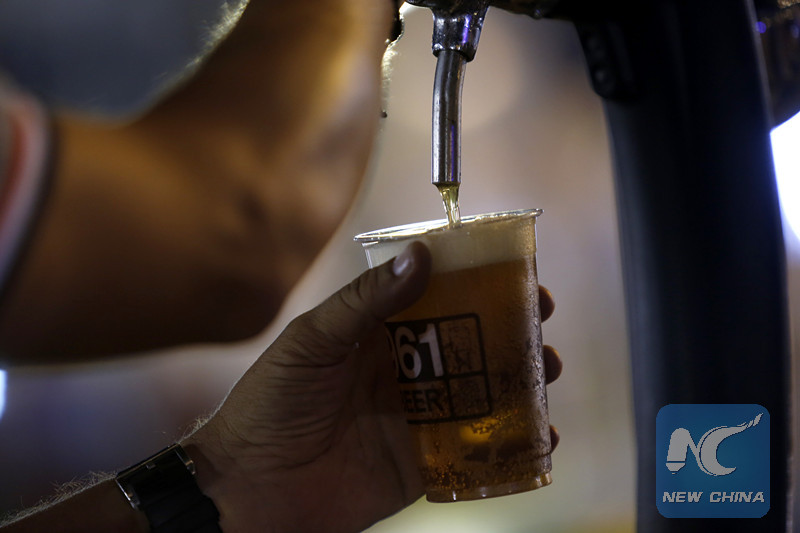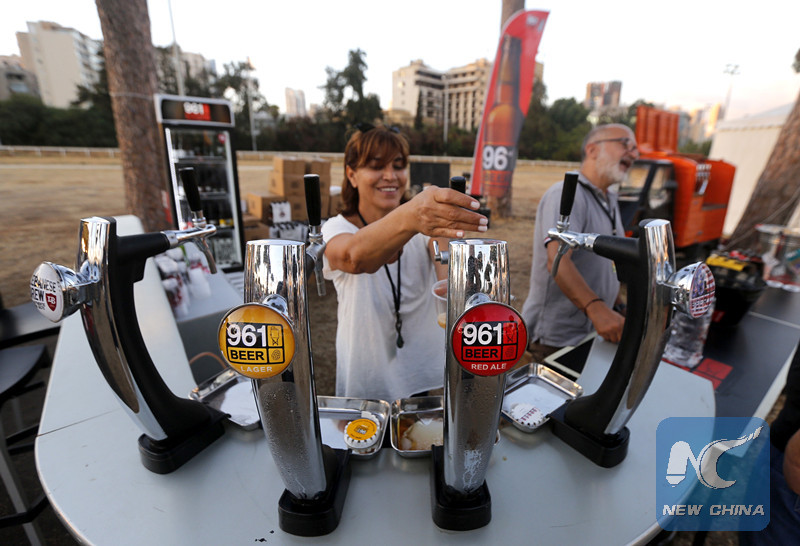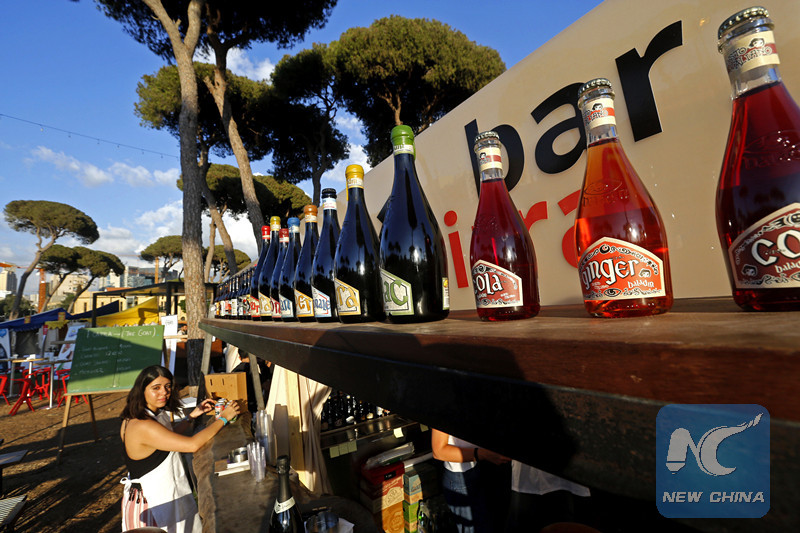
An exhibitor fills a glass with beer at the second editon of the Beirut International Beer Event(BIBE) held in Beirut, capital of Lebanon, on Sept. 14, 2018. (Xinhua/Bilal Jawich)
ZAHLE, Lebanon, Sept. 15 (Xinhua) -- Arak, a Lebanese local alcoholic beverage, has witnessed a remarkable slowdown in production in the past few years because of stiff competition from imported alcoholic beverages.
"The taste of people has changed tremendously," Joseph Haddad, owner of a small Arak factory in Zahle, told Xinhua that young people today prefer to drink imported alcoholic products such as beer, wine, vodka and whiskey.

An exhibitor fills a glass with beer at the second editon of the Beirut International Beer Event(BIBE) held in Beirut, capital of Lebanon, on Sept. 14, 2018. (Xinhua/Bilal Jawich)
Haddad's arguments were echoed by Fadi Hamra, who owns a tourist resort in Bekaa Valley, the capital city of which is Zahle.
"We see a lot of ads promoting wine nowadays, which attract a lot of clients to this product," said Hamra.
Abo George Saghbini, known to be "the King of Arak" in Lebanon, also warned that the import of alcoholic drinks will lead to the collapse of the Arak industry with time.
"The drop in the manufacturing of Arak weighed negatively on the economic situation in Zahle, as lots of citizens in the city rely on this production for their living," he lamented, holding in his hand a glass of Arak of his own production.
Considered an indigenous Lebanese alcoholic drink, Arak, made of grapes and aniseed, is as transparent as water. The production of Arak dates back to 1890, while its export started in 1920.
"Drinking Arak is one of the Lebanese traditions for celebration, served usually ahead of the main dish with Lebanese appetizers and grilled meat or fish," said Saghbini, already in his 70s.

Photo taken on Sept. 14, 2018 shows bottles of beer on display at the second editon of the Beirut International Beer Event(BIBE) held in Beirut, capital of Lebanon. (Xinhua/Bilal Jawich)
According to the old Lebanese man, Arak is different from other alcoholic drinks, as its color turns into milky white when water and ice are added before drinking to cover the strong smell of the aniseed.
The production of Arak typically goes through three stages, he explained.
In the first stage, grapes, harvested between September and October, are seeded and stored in barrels for 15 days to be fermented.
In the next two stages, alcohol is extracted from fermented grapes to get purified, and then turns into Arak with added aniseed.
Saghbini said the annual production of Arak has plummeted from 24 million bottles at the end of the 1980s to only 2 million nowadays.
In addition to competition from foreign alcoholic drinks, decline in grape production is another reason behind the slowdown of Arak manufacturing in Zahle.
Jalal Rahhal, a farmer who plants 48 hectares of grapes, said farmers in the past decade have gradually shifted to table grapes from grapes grown for Arak production to maximize their profits.
"It is more profitable for farmers to grow table grapes which sell at 1.5-2 U.S. dollars per kilo, while grapes used in producing Arak sell at fewer than 1 dollar per kilo," he explained.
According to the association of Bekaa traders, Lebanon exports about 20 percent to 25 percent of its Arak production, earning a revenue ranging between 3 million to 4 million dollars.
The top importers of Lebanese Arak are the United States, the United Arab Emirates and Iraq.
Meanwhile, the fading of the Arak industry dealt a blow to the employment market in Zahle, considered one of the most beautiful cities in Lebanon, since the industry provides hundreds of jobs in the city.
"We are proud of our traditional Arak and we hold on to it," said Haddad.

